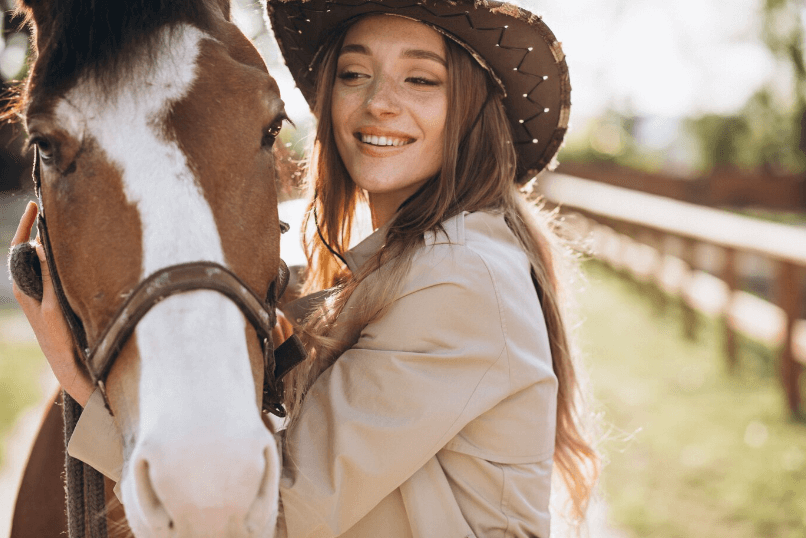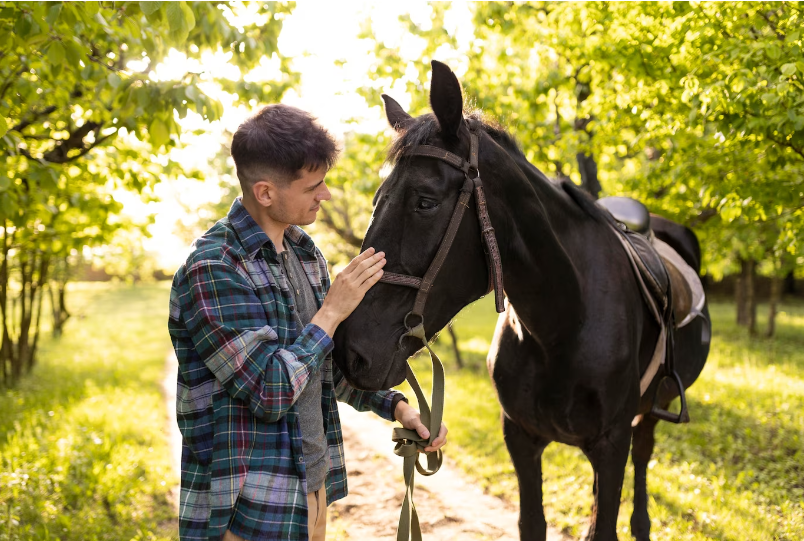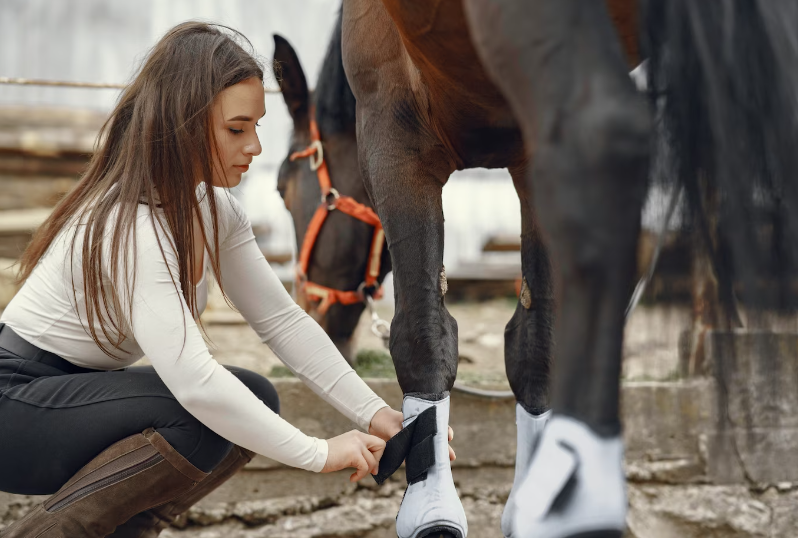A Horse Smiling Happiness in Horses

When it comes to understanding the emotions and behavior of animals, horses have always fascinated researchers and enthusiasts alike. The psychology of horses is a complex subject that continues to be explored, and one aspect that has caught the attention of many is the possibility of horses experiencing happiness. While it may seem unlikely at first, there are compelling reasons to believe that horses can indeed display signs of happiness, and even smile in their own unique way.
While horses may not have the ability to communicate their emotions through words like humans do, they certainly have their own ways of expressing themselves. Through careful observation and study, it has been found that horses exhibit behaviors that are indicative of positive emotions, such as a relaxed posture, a soft eye, and a playful demeanor. These behaviors, coupled with the horse’s natural ability to form social bonds, suggest that they are capable of experiencing happiness.
One of the most captivating manifestations of happiness in horses is their smiling behavior. Although a horse’s smile may not resemble a human smile, it can be spotted by a trained eye. When a horse is truly happy, their lips part slightly, revealing their teeth in a gentle, relaxed manner. This subtle expression of joy is a testament to the profound emotional depth that these magnificent creatures possess.
Understanding happiness in horses is not only a fascinating field of study, but it also has practical implications for their welfare and the way we interact with them. By recognizing the signs of happiness in horses, we can cultivate a deeper bond and understanding with these incredible animals. So let us embark on this enlightening journey into the psychology of horses and unravel the secrets behind their beautiful smiles.
Content:
The Importance of Horse Happiness
A horse is more than just an animal. It is a magnificent creature that possesses a wide range of emotions and behaviors. Understanding their happiness is crucial in ensuring their well-being.
Horses are known to show signs of happiness through various behaviors, one of which is smiling. Yes, you read that right – horses can smile! A horse smiling is a visual representation of their contentment and satisfaction.
By studying and interpreting a horse’s happiness, we can gain valuable insights into their overall health and quality of life. A happy horse is more likely to exhibit positive behaviors, such as playfulness and willingness to engage with their surroundings and humans.
When a horse is happy, it signifies that their physical and emotional needs are being met. Just like humans, horses have individual preferences and desires. By understanding what brings them joy, we can provide them with environments and activities that promote their happiness.
Horse happiness is not just about the horse itself – it also has an impact on the people who interact with them. A happy horse is more likely to develop a trusting and respectful bond with their handlers. This can lead to better cooperation and a safer environment for both the horse and the humans involved.
In conclusion, horse happiness is of paramount importance. By understanding and ensuring their happiness, we can create a harmonious relationship with these majestic creatures. So let’s appreciate their smiles, study their emotions, and strive to make every horse’s life a happy one!
Horse Behavior
Horses are fascinating animals that possess complex emotions and behaviors. Studying horse behavior allows us to gain a deeper understanding of their psychology and the factors that contribute to their happiness.
One essential aspect of understanding horse behavior is recognizing that horses are social animals. They live in groups with a hierarchical structure, where each horse has a specific role and position. This social structure impacts how horses interact with each other and influences their behavior.
Horses communicate with each other through a variety of signals, including body language, vocalization, and facial expressions. By paying attention to these communicative cues, we can better understand their emotions and intentions. For example, a horse with pinned-back ears and a tense body might be expressing fear or aggression, while a horse with relaxed ears and a soft eye might be displaying contentment.
Another important aspect of horse behavior is their instinctual nature. Horses have evolved as prey animals, which means they have heightened senses and a flight response to potential threats. Understanding this instinctual behavior allows us to create environments and interactions that make horses feel safe and secure.
Horses also have distinct personalities and temperaments, just like humans. Some horses may be more bold and outgoing, while others may be more cautious and reserved. Recognizing these individual differences helps us tailor our interactions and training methods to suit each horse’s needs and preferences.
Studying horse behavior is a continuous process, as horses can display a wide range of emotions and behaviors that are influenced by various factors, including their environment, health, and past experiences. By continually learning and observing horse behavior, we can enhance their well-being and ensure a harmonious partnership between humans and horses.
In conclusion, understanding horse behavior is essential for properly caring for these magnificent animals. It allows us to interpret their emotions, predict their reactions, and create environments that promote their happiness and well-being. By considering the horse’s psychology and behavior, we can develop a deeper bond and mutually beneficial relationship with these incredible creatures.
Factors Affecting Horse Happiness
Understanding the psychology behind a horse’s happiness is crucial for responsible horse ownership and care. While horses may not physically smile like humans, their behavior and emotions can provide valuable insights into their well-being.
Horses are highly social animals, and their happiness is greatly influenced by their social interactions. Being herd animals, horses thrive when they have the opportunity to interact with other horses and establish social bonds. Isolation and lack of companionship can lead to feelings of loneliness and unhappiness in horses.
Another important factor affecting horse happiness is their environment. Horses are naturally active animals, and they require ample space to move around freely and engage in natural behaviors like grazing and playing. Access to turnout and pasture can greatly contribute to a horse’s happiness and overall well-being.
Proper nutrition and healthcare also play a significant role in a horse’s happiness. A well-balanced diet that meets their nutritional needs ensures their physical health, which in turn affects their mental well-being. Regular veterinary care, dental check-ups, and farrier visits help prevent discomfort and pain, contributing to a happier horse.
Additionally, the quality of human-horse interactions influences a horse’s happiness. Positive reinforcement training methods that emphasize mutual trust and respect create a harmonious bond between horse and human. On the other hand, harsh training methods can lead to fear, stress, and a lack of happiness in horses.
In conclusion, understanding the various factors that affect horse happiness is essential for providing them with a fulfilling and satisfying life. Addressing their social needs, providing a suitable environment, ensuring proper nutrition and healthcare, and fostering positive human-horse interactions all contribute to creating a happy and content horse.
The Role of Environment in Horse Happiness
Understanding the behaviors and emotions of horses is essential for ensuring their happiness and well-being. Just like humans, horses can experience a range of emotions, including happiness. As sentient beings, they are influenced by their environment, and it plays a crucial role in their overall happiness and mental state.
1. Providing a Safe and Comfortable Space
A horse’s physical environment greatly impacts their happiness. They need a safe and horse-friendly space where they can move freely, graze, and interact with other horses. Adequate shelter, access to fresh water, and a balanced diet are essential for their well-being. Additionally, maintaining a clean and hygienic environment helps prevent stress and diseases.
2. Social Interaction and Individual Needs
Horses are highly social animals, and their happiness often depends on the quality and quantity of social interaction they receive. Providing opportunities for horses to socialize with other horses can greatly enhance their well-being. Understanding their individual needs and preferences is crucial, as some horses thrive in larger groups, while others may prefer solitary time.
Horses also need mental stimulation to prevent boredom and promote happiness. Enriching their environment with toys, puzzles, and varied activities can help keep their minds engaged. Regular exercise and opportunities to explore their surroundings are also important for their physical and mental health.
By understanding the psychology of horses and taking into account their behavioral needs, we can create an environment that promotes their happiness. A happy horse is more likely to exhibit positive behaviors, be receptive to training, and have improved overall health and well-being. Investing in their environment is not just beneficial for the horse but also for the humans who interact with them, fostering a positive and rewarding relationship.
Social Interactions and Horse Happiness
Behavior and emotions are closely linked in horses, and one important aspect of their behavior is social interactions. Just like humans, horses are social animals that thrive on social connections and relationships with others. Social interactions play a significant role in a horse’s overall well-being and happiness.
Studies have shown that horses engage in a variety of social behaviors, such as grooming each other, playing, and sharing resources. These interactions help to establish and maintain social bonds within a horse herd, which is essential for their mental and emotional health.
The Psychology of Horse Social Interactions
Horses possess a complex psychology that allows them to interpret and respond to social cues from other horses. They have a rich repertoire of facial expressions, body language, and vocalizations that they use to communicate with each other.
One fascinating behavior that can be observed in horses is smiling. Although horses don’t smile like humans do, they have their way of expressing happiness and contentment. A relaxed, open mouth with partially closed eyes is often interpreted as a horse’s smile. This expression is usually seen during positive social interactions, such as when horses are grooming each other or playing together.
Effects of Social Interactions on Horse Happiness
Positive social interactions have a profound impact on a horse’s happiness. They provide opportunities for horses to form and maintain social bonds, alleviate stress, and experience positive emotions. Regular social interactions can also enhance their overall mental and emotional well-being.
On the other hand, a lack of social interactions or negative social experiences can lead to loneliness, stress, and decreased happiness in horses. Just like humans, horses can experience social isolation and its negative consequences. That’s why it’s important for horse owners and caretakers to provide opportunities for social interactions and ensure a positive social environment.
Understanding the importance of social interactions and their effect on horse happiness is crucial for promoting the well-being of these magnificent animals. By promoting positive social interactions and creating a supportive social environment, we can contribute to the happiness and overall welfare of horses.
Recognizing Signs of a Happy Horse
Understanding the psychology of horses is essential in recognizing their emotions and well-being. Just like any other animal, horses have their unique behaviors that indicate their happiness. By paying attention to these signs, horse owners and caretakers can ensure the welfare and contentment of their equine companions.
Facial Expressions: Horses can show their happiness through their facial expressions, just as humans do when they smile. A happy horse may display relaxed and soft eyes, lifted and relaxed lips, and an overall calm appearance.
Body Language: A contented horse will have a relaxed body posture, with relaxed muscles and a lowered head. Their ears will be forward or slightly to the side, indicating attentiveness and curiosity.
Playfulness: When horses are happy, they often engage in playful behavior. They may run, kick, buck, or play with other horses, displaying energy and enthusiasm.
Willingness to Interact: A happy horse will willingly approach humans and show interest in interactions. They may nuzzle, lick, or groom their caretakers as a sign of trust and affection.
Appetite: A healthy appetite is another indicator of a happy horse. A contented horse will eagerly eat their meals and show enjoyment in consuming food.
Grooming Behavior: Horses groom each other as a way of bonding and showing social connection. If a horse engages in grooming behavior with its herd mates or caretakers, it is a positive sign of happiness and camaraderie.
Relaxed Breathing: A happy horse will have regular and calm breathing. They will not show signs of tension or stress, and their breaths will be deep and even.
Contentment: Ultimately, a happy horse will exhibit an overall sense of contentment. They will have a calm and relaxed demeanor, showing no signs of anxiety or fear.
By understanding the psychology of horses and recognizing these signs of happiness, horse owners can provide a nurturing and fulfilling environment for their equine friends.
Equine Body Language and Happiness
Horses are highly social animals that communicate through body language. By understanding their behavior and non-verbal cues, we can gain insights into their emotions and overall well-being.
One important aspect of equine body language is smiling. While horses don’t smile in the same way humans do, they do have facial expressions that can indicate happiness. A relaxed and content horse may have soft eyes, a slightly dropped lower lip, and ears positioned forward or to the side. These subtle cues can suggest a positive emotional state.
Horses also use their bodies to communicate happiness. A joyful horse may have a relaxed posture with a slightly arched neck, loose tail movement, and a spring in their step. They may engage in playful behaviors, such as bucking or rolling, to express their happiness and well-being.
Understanding equine body language is crucial for horse owners and handlers. It allows them to assess the emotional state of the horse and make informed decisions regarding their care and training. Recognizing signs of happiness can help ensure that horses are provided with an environment and experiences that promote their well-being.
| Behavior | Body Language | Emotional State |
|---|---|---|
| Soft eyes | Relaxed | Happiness |
| Slightly dropped lower lip | Content | |
| Ears positioned forward or to the side | ||
| Relaxed posture | Slightly arched neck | |
| Loose tail movement | ||
| Playful behaviors (bucking, rolling) |
Understanding equine body language and the various cues indicating happiness can strengthen the bond between horses and humans. By responding to their needs and providing them with positive experiences, we can contribute to the overall happiness and well-being of these magnificent animals.
Promoting Happiness through Proper Care
Horses are highly intelligent and sensitive creatures, capable of experiencing a wide range of emotions, including happiness. Understanding the horse’s natural behavior and psychology is essential in promoting their well-being and smiling faces.
Proper care is crucial in creating a happy environment for horses. This includes providing them with a balanced diet, clean water, and comfortable shelter. Regular veterinary check-ups and vaccinations are also necessary to keep them healthy and happy.
Horses are social animals, and they thrive in the company of others. Providing them with the opportunity to interact and socialize with other horses is vital for their emotional well-being. They enjoy grazing together, playing, and grooming each other, forming strong bonds that contribute to their happiness.
Furthermore, engaging in regular physical activities and exercise is essential for their mental and physical well-being. Horses are natural athletes, and they need regular opportunities to stretch their legs and move around. This not only keeps them physically fit but also helps to relieve stress and improve their overall happiness.
Understanding and fulfilling the horse’s natural instincts is another crucial aspect of promoting their happiness. For example, providing them with access to pasture allows them to graze freely, fulfilling their natural foraging behaviors. Providing them with toys or objects to play with can also keep them mentally stimulated and happy.
Lastly, creating a calm and peaceful environment is essential for a horse’s well-being. Loud noises, chaotic surroundings, and excessive handling can cause stress and anxiety in horses. Providing them with a quiet and safe space where they can feel protected and secure contributes to their happiness.
In conclusion, promoting happiness in horses requires a comprehensive approach that encompasses their overall care and well-being. Understanding their emotions, natural behavior, and psychology is crucial in creating an environment where they can thrive and smile.
Activities and Enrichment for Happy Horses
Horses are intelligent and social animals capable of experiencing a range of emotions, including happiness. Understanding the emotions of horses is crucial for their well-being and our ability to provide them with appropriate care. In order to ensure the happiness of horses, it is important to engage them in activities and enrichment that fulfill their physical, mental, and social needs.
Physical Activities
Physical activities play a crucial role in keeping horses happy and healthy. Regular exercise helps horses maintain a healthy weight, improves their cardiovascular fitness, and prevents boredom. Some popular physical activities for horses include:
- Daily turnout in a spacious paddock or pasture, allowing horses to stretch their legs and socialize with other horses.
- Trail riding, providing horses with mental stimulation and exposure to different environments.
- Jumping or dressage training, which engages horses mentally and physically while improving their coordination and balance.
- Longeing or lunging, a form of exercise that allows horses to stretch and move freely while being directed by a handler.
Mental Enrichment
Keeping horses mentally stimulated is just as important as providing them with physical activities. Mental enrichment prevents boredom, reduces stress, and promotes overall well-being. Here are some ideas for mental enrichment for horses:
- Providing toys and puzzles specifically designed for horses, such as treat balls or hanging feeders, which encourage problem-solving and provide mental stimulation.
- Introducing novel and varied environments during training sessions or trail rides, allowing horses to explore and adapt to new situations.
- Training sessions that incorporate new and challenging tasks, keeping horses engaged and mentally stimulated.
- Using positive reinforcement training methods, which encourage horses to actively participate in learning and problem-solving activities.
Social Interaction
Horses are social animals that thrive on companionship and interactions with other horses. Social interaction is essential for their mental and emotional well-being. Here are some ways to promote social interaction for horses:
- Turnout with compatible herd mates, allowing horses to engage in natural herd behaviors and form social bonds.
- Arranging playdates or group turnout sessions with other horses, providing opportunities for socialization and play.
- Participating in group training sessions or clinics, where horses can interact with other horses and their handlers.
- Attending horse shows or events, exposing horses to a variety of horses and people, and fostering socialization.
By engaging horses in a range of physical activities, providing mental enrichment, and promoting social interaction, we can contribute to the happiness and well-being of these magnificent animals. Understanding the psychology of horses and catering to their individual needs is key to ensuring they lead fulfilling lives.
The Benefits of a Happy Horse
Understanding the behavior and happiness of horses is essential for every horse owner. When a horse is truly happy, it can have a positive impact on both its physical and mental well-being.
Improved Health
A happy horse tends to have better overall health. When a horse is content and satisfied, its immune system functions more effectively, making it less susceptible to illnesses and diseases. In addition, a happy horse is more likely to have a strong appetite and maintain a healthy weight, which is crucial for its overall well-being.
Positive Behavior
A horse that is truly happy is more likely to display positive behavior. It will be well-behaved, responsive, and willing to cooperate with its handler or rider. This can make training and handling much easier and safer. A happy horse will also exhibit fewer signs of stress and anxiety, such as biting, kicking, or cribbing.
Enhanced Performance
A happy horse will perform better, whether it is in competitive sports or daily activities. Horses that are content and fulfilled are more focused and willing to work, resulting in improved performance and higher success rates. Additionally, a happy horse is less prone to injuries and can recover more quickly in case of any physical setbacks.
In conclusion, understanding the psychology of horses and promoting their happiness is of utmost importance. A smiling horse not only brings joy to its owner but also guarantees a healthy, well-behaved, and high-performing animal.
Q&A:
Can horses experience happiness?
Yes, horses can experience happiness. They can express their emotions in various ways, including smiling.
What does it mean when a horse smiles?
When a horse smiles, it can indicate that the horse is feeling content, relaxed, and happy. It is a positive expression of their emotions.
How can you tell if a horse is happy?
There are several signs that can indicate a horse is happy. These can include a relaxed body posture, ears facing forward, a soft and gentle look in their eyes, and a willingness to engage and interact with their environment and humans.
Can horses smile on command?
Horses cannot smile on command as humans do. Their smile is a natural expression of their emotions, meaning that they will smile when they genuinely feel happy and content.
Why is it important to understand happiness in horses?
Understanding happiness in horses is important because it allows us to better care for their emotional well-being. By recognizing the signs of happiness in horses, we can ensure that their environment and interactions meet their needs, leading to a better quality of life for these animals.
Why do horses smile?
Horses don’t actually smile in the way humans do. The term “smiling” is used metaphorically to describe a horse’s relaxed and content facial expression.


